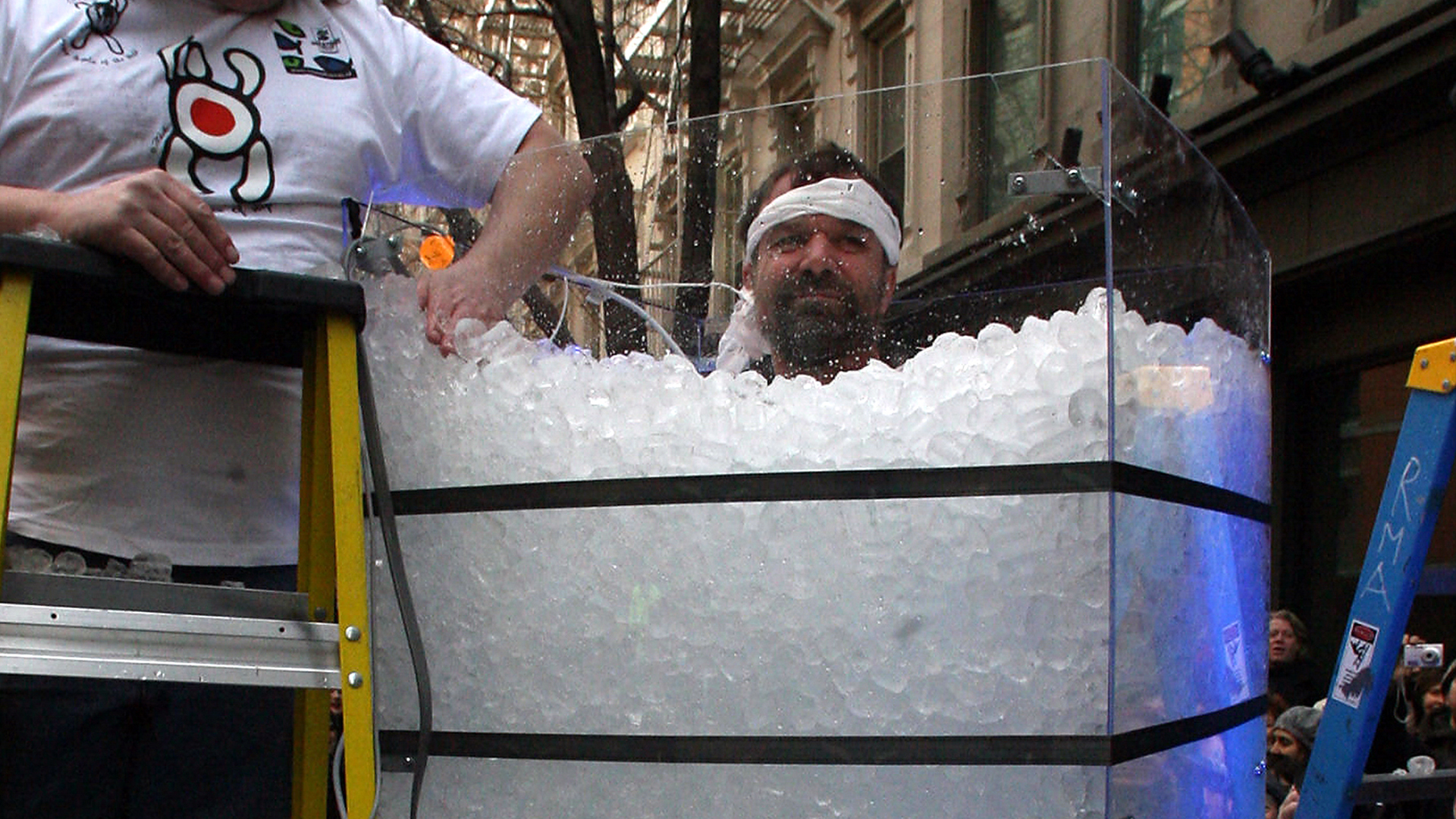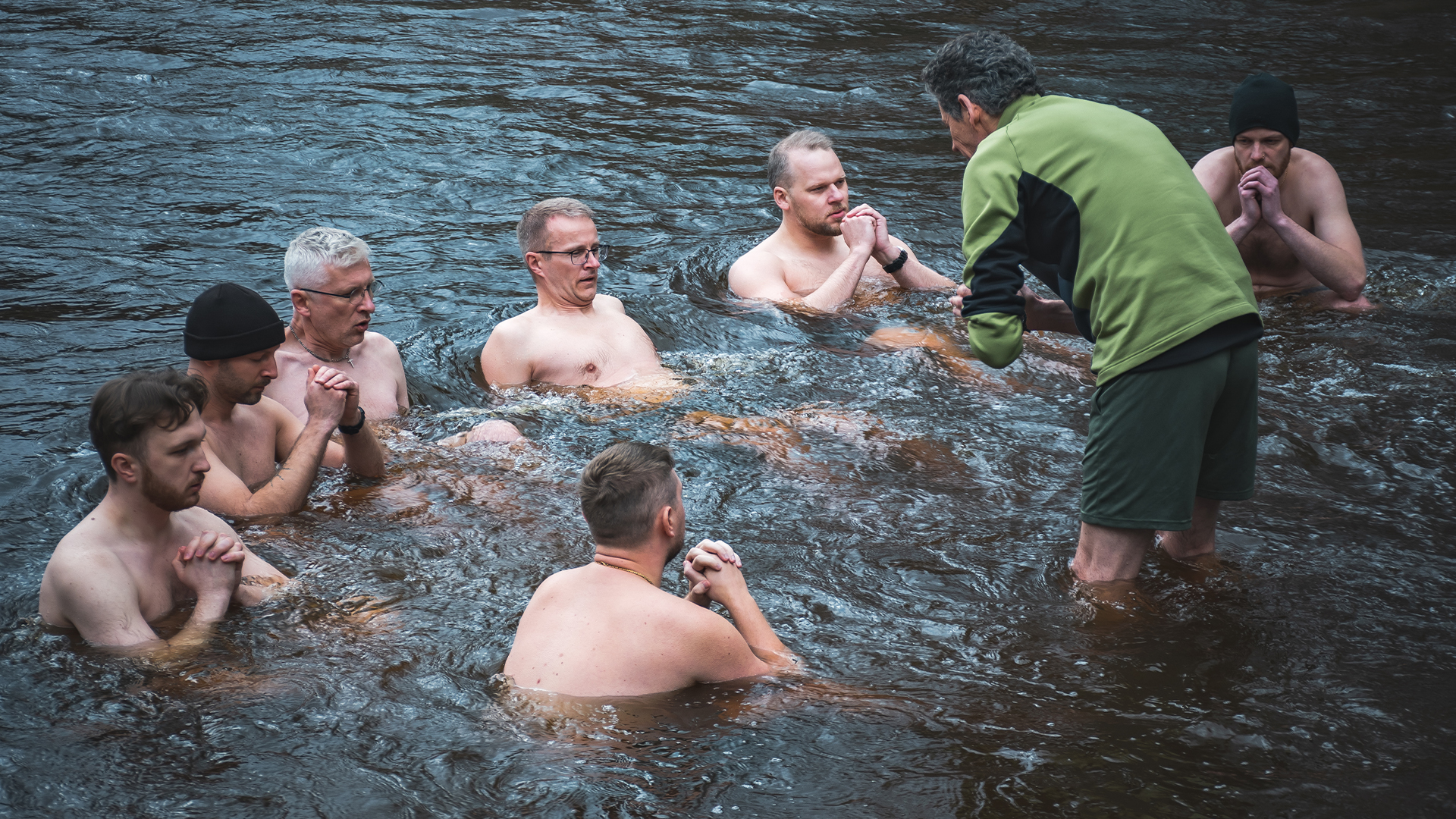Ice-cold plunges and breath-holding: Does the 'Wim Hof method' do anything?
Wim Hof, known as "The Iceman," purports a combination of breathing exercises and cold exposure has many health benefits. But a new review of studies finds there's limited evidence.

Can breathing exercises and ice baths make you a better, healthier version of yourself? Scientists have found there may be some benefits — but ultimately, the jury is still out.
A new review of research focuses on the "Wim Hof method," a regimen of breath-holding and cold exposure promoted by Dutch athlete Wim Hof, nicknamed "The Iceman" for performing athletic feats in extremely cold temperatures. Hof's website describes this method as having myriad benefits, such as increased willpower; fat loss; a "fortified" immune response; "balanced" hormones; and reduced inflammation.
However, the new review finds there is limited evidence for these purported benefits. Although some research hints that Hof's methods might reduce inflammation, according to the review authors, the studies done to date are simply not high-quality enough to answer the question of whether the Wim Hof method does any good.
"Due to the low methodological quality and small sample sizes, caution is necessary when interpreting the findings," study author Omar Almahayni of Warwick Medical School in the U.K., told Live Science. "While some positive effects are observed, such as attenuation of inflammation, the overall benefits remain uncertain."
Reviewing the Iceman's methods
Hof's method involves three activities: breathing exercises consisting of 30 deep breaths followed by a period of breath-holding; exposure to cold; and meditation focused on increasing willpower.
Separately, some of these strategies have been shown to have psychological or physiological effects. Mindfulness-based therapy, which incorporates meditation, can reduce anxiety, depression and stress, according to a 2013 review of more than 200 studies. Breathing exercises can have a small-to-medium effect on some people's stress levels, according to a 2023 review of 12 studies.
Get the world’s most fascinating discoveries delivered straight to your inbox.
The effect of cold exposure is — ironically — hotly debated. Some research suggests taking a polar plunge or open-ocean swimming may improve one's short-term mood and athletic performance, but much of that research has been done on small groups of people. Some studies of cold immersion have tied it to benefits like improved insulin sensitivity — but according to a 2022 review, most of those studies were small and had other limitations, such as including study subjects of only one sex and not having adequate comparison groups.
"We have lots of studies where people have reported perceiving that cold water immersion is 'good for them,' but virtually no properly controlled mechanistic studies," said Mike Tipton, a professor of human and applied physiology at the University of Portsmouth who was not involved in the new review, told Live Science in an email.
"We don't have really good clinical trials, well-controlled, adequately-powered clinical trials on cold stress," agreed Christopher Minson, an environmental physiologist at the University of Oregon who was not involved in the review. "We just don't have it."
But that doesn't necessarily mean there isn't a benefit, Minson noted. Jump into ice-cold water and your blood vessels will constrict, your heart rate will jump, and your breathing may turn into gasping. Experiencing this stress and then recovering from it may have both physical and mental effects, he said.
In a recent study, Minson and colleagues found that people experienced fewer negative emotions several hours after a cold plunge than they did just before it. They also saw declines in the stress hormone cortisol several hours after the plunge.
But overall, research on the Wim Hof method suffers from a lack of comparison to other potentially beneficial activities, Tipton said. The new review, published March 13 in the journal PLOS One, pulled together nine trials that put the method to the test. All of the trials compared Wim Hof's strategies to doing nothing at all. The review authors identified all the trials as having a high chance of returning biased results.
"This methodological approach tells us nothing about the relative benefits against other interventions," such as yoga, walking or swimming in an indoor pool, Tipton said. "Without a sham/alternative active intervention, we can learn very little about the relative value of the [Wim Hof method]."
In studies of cold exposure, a sham intervention might involve participants dousing themselves in lukewarm water for the same amount of time as another group gets the ice-bath treatment, Minson explained.
What we know at this point
Two of the reviewed studies that investigated inflammatory responses found that the Wim Hof method was linked to lowered levels of inflammation after people adopted the practice for several days or weeks. However, these preliminary findings were hard to trust, Almahayni said.
"More evidence needs to be synthesized about the Wim Hof Method before being recommended to the public," he said.
It makes sense that the research hints at an effect of the Wim Hof method on inflammation, Minson said, as cold is generally known to reduce inflammation in the short-term. However, whether that's good for one's health depends on the situation.
Exercise triggers a transient inflammatory response that helps build muscle and thus improve performance; reducing that response can reduce the benefits of exercise. However, if someone is experiencing chronic inflammation, turning down that inflammatory response might be desirable, Minson said.
Even if there are benefits, cold immersion comes with some risks. The shock of sudden immersion in cold water can trigger hyperventilation and heart-rate changes that cause people to drown, Tipton said.
People who want to try it should first get a checkup to ensure they don't have any underlying conditions that might make a polar plunge particularly dangerous. When swimming in cold water, Tipton said, make sure that there's a lifeguard nearby. It's better to enter the water slowly rather than all at once, he added, to avoid the automatic gasping response that can cause people to inhale water into their lungs.
More properly controlled studies are needed to know whether the effects of Wim Hof's method are more than a placebo effect, Tipton said. For people who feel that cold-water immersion has improved their lives, "that is great," he said. "I just want to make sure they get these perceived benefits as safely as possible."
This article is for informational purposes only and is not meant to offer medical advice.
Ever wonder why some people build muscle more easily than others or why freckles come out in the sun? Send us your questions about how the human body works to community@livescience.com with the subject line "Health Desk Q," and you may see your question answered on the website!

Stephanie Pappas is a contributing writer for Live Science, covering topics ranging from geoscience to archaeology to the human brain and behavior. She was previously a senior writer for Live Science but is now a freelancer based in Denver, Colorado, and regularly contributes to Scientific American and The Monitor, the monthly magazine of the American Psychological Association. Stephanie received a bachelor's degree in psychology from the University of South Carolina and a graduate certificate in science communication from the University of California, Santa Cruz.
 Live Science Plus
Live Science Plus






